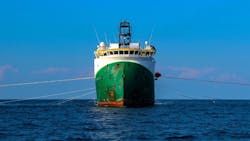Opinion: 5 misunderstandings about offshore energy geoscience
By Nikki Martin and Gail Adams, EnerGeo Alliance
The energy world is surrounded by misconceptions, fueled by a lack of overall understanding, concerted efforts to misrepresent or vilify the industry, and the perennial challenge of translating the technical and scientific complexities of what energy companies do every day to the public.
Correcting the record is critical when you consider just how fundamental energy is to everyone on the planet.
Offshore energy, in particular, struggles with misconceptions for all of the reasons above. For those of us in the energy geoscience world, that communication and understanding gap widens while sharing the same contours of misunderstanding.
Many people outside of energy are unfamiliar with our cornerstone role in producing the energy people around the world use every day. Energy geoscience is the intersection of where energy and earth science meet.
EnerGeo Alliance represents the geoscience companies, innovators and energy developers that use earth science to sustainably discover, develop and deliver energy and low-carbon solutions to the world. As a non-partisan and not-for-profit trade association, we advocate for geoscience-driven energy policies that connect more people and communities to accessible energy around the world.
Even though by current market capitalization, our companies are a small part of the energy supply chain, we are the first link when it comes to accessing energy in any given region. Our industry is the tip of the spear for nearly all energy sources and lower-carbon solutions, and the work our companies do is essential for energy today and tomorrow.
Role of offshore geoscience
Geoscience surveys have been used globally for more than six decades for natural gas and petroleum exploration. These same survey techniques are also used for offshore wind, geothermal energy and low-carbon solutions such as carbon capture and storage. Whatever the future of our energy evolution looks like, geoscience is going to play a central role.
When you think of cutting-edge technology and innovation that translates into cost savings, protection of the environment and increased access to safe affordable energy that transforms the world, you are thinking of us—whether you realize it or not.
What the offshore energy and the geoscience industries share are common misconception gaps, ones we are confident we can play an essential role in changing for our industry and the industries we serve.
Professionalism
We all know that energy exploration is a highly technical and scientific activity, but the world does not—in large part because communicating the technical is challenging in and of itself, and again, because there is an entire cottage industry built around vilifying energy companies.
In our industry, that means geologists, geophysicists, hydrologists, chemists, engineers, soil and plant scientists, and more are needed to bring affordable energy to the world. This industry is not only high-tech but has blazed the path for Big Data and a host of modern innovations enjoyed by citizens of the world today. Geoscience technology and innovation have literally transformed energy.
Energy poverty
Then let’s talk about the big-picture misconception: that the energy industry doesn’t care about people. Wrong again.
Energy is something everyone takes for granted until they don’t have it, or need it. Consider the following: By 2050, the world’s population is set to approach 10 billion people, and total energy use is expected to increase 50%.
Today, 30% of the world has no access to clean fuels for cooking and 10% has no access to basic electricity, and over 60% of the world is living in some form of energy poverty. Energy poverty is a global issue, and even in the US, many populations, especially communities of color, are at even greater risk now as the gap between energy supply and energy demand widens.
Those are daunting, stark facts about our fellow humans, and we are in a position to do something about it. Eliminating energy poverty remains a top priority of UN Sustainable Development Goals, so we need all sources of energy at the table to meet skyrocketing demand for energy security and energy accessibility.
Energy geoscience connects people around the world to energy, especially in the developing world where energy abundance can truly transform countries. Just look at the offshore energy work happening in Guyana and the fundamental national change for the better—greater wealth, employment and the essential services that follow—developing as a result.
That could not have happened without the offshore and geoscience energy industries working together.
Energy transition
Another enormous misconception involves the so-called “energy transition.”
At EnerGeo Alliance, we don’t use the term "transition" because that implies leaving one source of energy for another, or that we have the problem solved with one set of solutions. No matter what anyone says, however well intended, that is not true.
Wherever you are on the path of the energy evolution, we are expanding and evolving to meet growing demand, and geoscience is part of the equation of adding more energy while reducing the world’s carbon footprint.
As nations develop and implement their energy evolution goals to make reliable, affordable energy available to their citizens and meet net-zero emissions policy ambitions, it is important to understand that those goals cannot and will not be realized without the critical data and technology the geoscience industry provides.
No geoscience, no net zero, no energy evolution.
Environmental stewardship
Another misconception is that offshore energy is “dirty” and cares about profits over the environment. We respectfully disagree.
The low-carbon intensity of production in the Gulf of Mexico is proof positive that developing our natural energy resources and environmental stewardship are not mutually exclusive. That is the result of constant innovation, and the result of the smartest minds in the industry collaborating to solve our biggest challenges.
For example, our members and industry partners worked together to publish an industry-first "Guidance for Estimating and Reporting Greenhouse Gas Emissions for Marine Geoscience Activities," providing metrics for the transparent, consistent and voluntary reporting of Scope 1, 2 and 3 emissions. That is one way for the offshore energy geoscience industry to demonstrate the reality that safety and environmental stewardship are built into our operating manuals.
Future of nat gas and petroleum
A related misconception that dogs the offshore and geoscience industries is that natural gas and petroleum are being eliminated tomorrow. Not true, and this is a misconception we can change, borne out by many credible studies and the simple act of looking at what happened after Russia invaded Ukraine—reliable, affordable sources of energy like natural gas and petroleum shot back into demand. IEA increased the forecasted 2023 demand to record highs, and nearly all projections by 2050 estimate natural gas and petroleum alone will need to supply 50% of the world’s energy demand.
The energy industry, often conservative and cautious when it comes to stating the obvious, must be resolute on this point, or we must own that misconception laid on our doorstep.
Industry growth
Communicating what we do has not always been an energy industry strong suit, but that must change so our seat at the table is respected and understood for what it is: necessary for the growth and betterment of the world and its people.
When we re-imagined our new name, we envisioned EnerGeo Alliance as a starting point for the education and myth-busting we intend to do, as that first link in energy’s vast supply chain from exploration to production and lower carbon energy solutions to contributing to human well-being and prosperity.
We hope our industry partners will join us in that mission to end the misconceptions so we can get back to the work we all do best: bringing energy to the world.
05.16.2023
About the authors:



